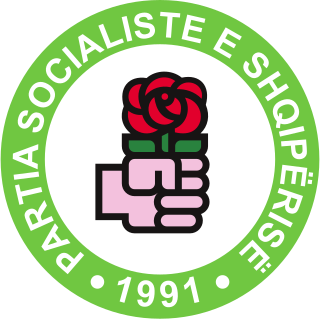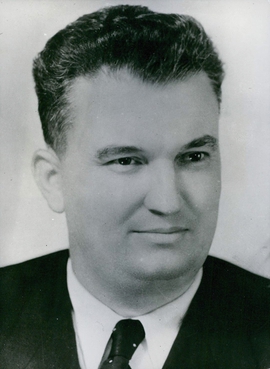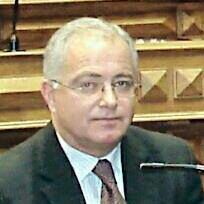
Eduard Selami is an Albanian politician. From 1992 to 1995 he served as Chairman of the Democratic Party of Albania. [1] On 5 March 1995, he was ousted as Chairman of the Democratic party. [2]

Eduard Selami is an Albanian politician. From 1992 to 1995 he served as Chairman of the Democratic Party of Albania. [1] On 5 March 1995, he was ousted as Chairman of the Democratic party. [2]

Sali Ram Berisha is an Albanian conservative politician who served as the third president of Albania from 1992 to 1997 and 32nd prime minister from 2005 to 2013.

Edi Rama is an Albanian politician, painter, writer, former university lecturer, publicist and former basketball player, who has served as the 33rd and current Prime Minister of Albania since 2013 and chairman of the Socialist Party of Albania since 2005. Prior to his tenure as Prime Minister, Rama held a number of positions. He was appointed Minister of Culture, Youth and Sports in 1998, an office he held until 2000. First elected mayor of Tirana in 2000, he was reelected in 2003 and 2007.

The Socialist Party of Albania is a social-democratic political party in Albania. It has been described as centre-left. It was founded on 13 June 1991. The PS is an associate of the Party of European Socialists and a member of the Socialist International, and holds pro-European views.

The Democratic Party of Albania is a conservative political party in Albania. It has been the largest opposition party in the country since 2013.

The Albanian National Front Party is a nationalist political party in Albania, Kosovo, and North Macedonia.

The Republican Party of Albania is a national-conservative political party in Albania. It currently holds 3 of the 140 seats in the Parliament of Albania, in alliance with the Democratic Party of Albania.

Azem Shpend Hajdari was the leader of the student movement in 1990–1991 that led to the fall of communism in Albania. He then became a politician of the Democratic Party of Albania (DP). He symbolizes the start of the democratic era in Albania. He was a member of the Albanian parliament and the Chairman of the Defence Parliamentary Commission. He was assassinated in Tirana on September 12, 1998.
Zef Bushati is the ambassador of Albania to the Holy See since 10 May 2002. This followed the signing of an Agreement of Cooperation between Albania and the Holy See on 23 March 2002, which was at that time awaiting the ratification of the Albanian parliament.

The Party of Labour of Albania (PLA), also referred to as the Albanian Workers' Party (AWP), was the ruling and sole legal party of Albania during the communist period (1945–1991). It was founded on 8 November 1941 as the Communist Party of Albania but changed its name in 1948. The party was dissolved on 13 June 1991 and succeeded by the Socialist Party of Albania. For most of its existence, the party was dominated by its First Secretary, Enver Hoxha, who was also the de facto leader of Albania.

The Demochristian Party of Albania is a small Christian democratic political party in Albania.

The New Democratic Party was a centre-right, conservative political party in Albania founded in 1999 as a split from the Democratic Party of Albania. It was led by Genc Pollo.

Ilir Rexhep Meta is an Albanian politician. He served as President of Albania from 24 July 2017 to 24 July 2022.

Bamir Myrteza Topi is an Albanian diplomat and politician. He also was the President of Albania from July 2007 to July 2012.

Pjetër Filip Arbnori was an Albanian gulag survivor. He was dubbed "the Mandela of the Balkans" by Albanian statesmen because of the length of his 28-year internment. He was born in Durrës, on the Adriatic coast. President Topi bestowed the Nation's Honor Order upon Pjetër Arbnori.

Lulzim Basha is an Albanian politician who served as the chairman of the Democratic Party of Albania, and as the leader of the opposition, from 2013 to 2022. Basha was elected as chairman of the Democratic Party of Albania in September 2013 following the Democratic Party's electoral loss which sent them in the opposition. In 2021, he became the first opposition leader in Albanian history to lose two general elections in a row, although Basha claimed the losses came as a result of significant electoral interference by the ruling Socialist Party.
The fall of Communism in Albania, the last such event in Europe outside the Soviet Union, started in December 1990 with student demonstrations in the capital, Tirana, although protests started in January that year in other cities like Shkodra and Kavaja. The Central Committee of the communist Party of Labour of Albania allowed political pluralism on 11 December and the largest opposition party, the Democratic Party, was founded the next day. March 1991 elections left the Party of Labour in power, but a general strike and urban opposition led to the formation of a "stability government" that included non-communists. Albania's former communists were routed in elections in March 1992 amid economic collapse and social unrest, with the Democratic Party winning most seats and its party head, Sali Berisha, becoming president.
In 1991, the Socialist Party of Albania, with specific social democratic ideology took control of the country through democratic elections. One year later the Democratic Party of Albania won the new elections. After 1990, Albania has been seeking a closer relationship with the West. What followed were deliberate programs of economic and democratic reform, but the implementation of capitalism led to the proliferation of pyramid schemes. Chaos in late 1996 to early 1997, as a result of the collapse of these pyramid schemes, alarmed the world and prompted the influx of international peacekeeping forces. In 1995, Albania was accepted into the Council of Europe and requested membership in NATO and is a potential candidate country for accession to the European Union. The workforce of Albania has continued to emigrate to Western countries, especially Greece and Italy.

The National Liberation Movement, also translated as National Liberation Front, was an Albanian communist resistance organization that fought in World War II. It was created on 16 September 1942, in a conference held in Pezë, a village near Tirana, and was led by Enver Hoxha. Apart from the figures which had the majority in the General Council it also included known nationalists like Myslim Peza. In May 1944, the Albanian National Liberation Front was transformed into the government of Albania and its leaders became government members, and in August 1945, it was replaced by the Democratic Front.

Gogo Nushi was an Albanian political figure who served in a number of positions in Albania during its socialist period.

Edmond Spaho is an Albanian Democratic Party politician and the Member of Parliament (MP) for Korca since 25 April 2021.